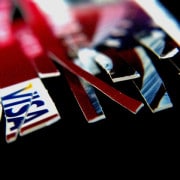
Missing Payments And Charge-Offs
Whether it’s a mortgage, student loan, or credit card, you have to make payments on your debts in a timely fashion. Typically you’ll need to pay once a month. If you miss a payment, you may have a short “grace period” to catch up before you run into any real penalties. The length and terms of your grace period depend on the specifics of the loan, but can be anywhere from a few days to a month long. If you don’t pay by the end of the grace period, you’ll face late fees and other charges. Once the grace period has expired, your lender will report the issue to the credit bureaus.
When you’re behind on your payments, your account is considered “delinquent.” After a certain amount of time in delinquency, your account will be considered “in default.” The exact time when delinquency passes into default depends on the type of loan. Student loans typically go into default after nine months of nonpayment while mortgages will typically be in default after six months of nonpayment. When you’re in default, you’ve officially breached the terms of the loan contract and may face serious penalties. For example, some mortgage loans become due in their entirety if the account goes into default, meaning you have to pay the entire balance at once.
When your mortgage loan goes into default, the lender can initiate foreclosure proceedings. When your student loan goes into default, the federal government can pursue collection via wage garnishment and other collection actions. When your credit card account goes into default, your lender may sell the account to a collection agency and “write the debt off.” This is called a “charge-off.”
Charge-Offs
A charge-off, or “chargeoff,” usually happens after 180 days of nonpayment on a credit card account. A charge-off is an accounting designation – it doesn’t mean that the debt is wiped away. The account is “charged off” of the lender’s balance sheet, not off of your record. They need to account for the money that they’ve lent but won’t be able to collect; it’s a loss on their books. However, they can’t wait forever to account for that loss. So, the standard practice is to write the debt off as uncollectable after 180 days.
An account that has been charged off will continue to show on your credit report as a long-term, unpaid debt. That will lower your credit score. In addition, accounts that are charged off are often sold to collection agencies. That debt transfer will also show up on your credit report as a collection account and damage your credit score. That can make it harder to get a cell phone plan, rent an apartment, buy a car, and more.
Put simply, a charge-off is bad news for your credit.
Do I still have to pay an account that has been charged off?
In a word, yes. You still owe the debt and it will continue to damage your credit. Your lender or the collection agency that acquires your account may continue to attempt to collect. However, you’re not stuck with a charge-off account forever. By law, your debts can only be collected for a certain number of years. That’s called the statute of limitations, and in California it’s generally 4 years. After that time, your lender or collection agency can no longer sue you for collection.
While a charged-off account can’t be collected after 4 years, it will remain on your credit report for 7 years. The effect on your score will get smaller over time until the account is removed completely.
How can I get rid of a charged-off account?
The simplest way to get rid of a charged-off account is to pay it. That will also have the biggest benefit for your credit score. However, it’s not always so easy to get enough cash together to pay off an old account. If that’s the case, there are other options to help you manage that debt.
You may choose to consolidate or refinance your debt. You may be able to get a lower interest rate or make a smaller lump sum payment to clear the account. You may also consider filing a personal bankruptcy to wipe out your debts entirely.
Bankruptcy And Charge-Offs
Filing a bankruptcy can help you wipe out all of your debts, not just old accounts. A charged off credit card account is an unsecured debt, meaning a debt that is not linked to any particular piece of property as security. If you file a Chapter 7 bankruptcy, you’ll surrender your non-exempt property in exchange for wiping out your unsecured debt. Most debtors only have exempt property, so their debts are forgiven without giving up any assets. If you file under Chapter 13, you’ll make small monthly payments for 3-5 years. At the end of that time, whatever remaining unsecured debt you have will be forgiven. So, either type of bankruptcy can wipe out your charged off accounts and other unsecured debts.
We Can Help
If you’re struggling with debts and tired of the collection calls, contact us today for a free consultation to discuss ways to manage your debts and get your finances back in order. Our experienced attorneys are standing by to help.
Image Credit and License
